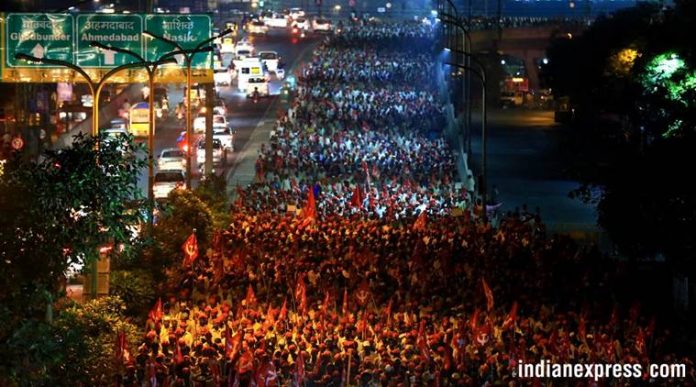Image Credits: Indian Express
Through Sunday, the financial capital witnessed 40,000 farmers and tribals from across Maharashtra march slowly across the length of the city. Having walked over 160 km in six days, the men and women traversed their final 20 km into central Mumbai even as the state government scrambled to prevent the embarrassment of a gherao of the legislature as threatened by the CPI (M)-affiliated All India Kisan Sabha that has organised the long march.
The farmers, including a very large number from tribal-dominated talukas in Nashik, Thane and Palghar, are demanding a loan waiver free of any conditions, implementation of the Forest Rights Act, fixed remunerative prices for agri produce, and implementation of the recommendations of the Swaminathan Commission.
As the Shiv Sena, Congress, MNS, and others extended support to the protesting farmers, Chief Minister Devendra Fadnavis invited a delegation of farmer leaders for talks on Monday afternoon. Who are among the protesting 40,000?
Radhabai Kisan Gagonde, 65
The senior citizen from Dahivi village in Nashik’s Dindori tehsil has walked all six days. She is seeking transfer of a one-acre plot of forest land that she has been tilling for two decades to her name. “I spent my entire life working in others’ fields. Now, I want the land to be transferred to our names, so that my grandchildren are able to get an education and have a better life,” said Radhabai, who is a member of the Kisan Sabha, and had been among the 40,000 farmers who protested in Nashik city in March 2016.
Hiraman Waghmare, 46
Hiraman tills five acres of forest land in Chikadi village in Nashik’s Suhana tehsil. He is entirely dependent on a good monsoon. “I don’t have money for a well or a borewell. I also work as a farm labourer and get Rs 50-100 per day,” he said. He hopes that once the forest land that his community has been tilling for decades is transferred to their names, he might be able to get a loan. “Maybe then I can make some arrangements for irrigating the land.”
Rajebhau Rathod, 42
A farmer from Surpimpri village in Parbhani district in the arid Marathwada region, Rathod was elated when the government announced a Rs 34,000-crore farm loan waiver, but his joy was short-lived. “I had taken a crop loan of Rs 1.80 lakh in 2012, but couldn’t repay it due to the drought years after that. My three acres of land is non-irrigated, and I have been unable to get any profit from farming,” he said.
He expected to be one of the beneficiaries of the loan waiver, and hoped that he would then be able to access a fresh loan for digging a well or a borewell. “But my application for the waiver was rejected,” said Rathod. He said he does not know why he was found ineligible; the bank had simply informed him his name is not on the list of beneficiaries.
Ramraje Mahadik, 40
A 40-year-old farmer from Manvat village in Parbhani district of Marathwada, Mahadik is demanding compensation for his cotton crop damaged by a pink bollworm attack. “My crop was hit very seriously. The yield fell from 10 quintals per acre to just 2-3 quintals per acre this year. From my three acres of land, I have been able to get only 12 quintals of cotton. The government announced it would compensate for the damaged crop, but no money has come yet,” he said. Having heard that some villages in Parbhani were excluded from compensation, he said: “What’s our fault? The state must give us compensation.”
Sunil Mohondkar, 26
This young tribal from Aghai village in Shahapur tehsil, Thane, has come seeking transfer of forest land to his name and also seeking a government directive that water from the Tansa dam in Shahapur, which currently supplies water to Mumbai, be used for farming. “I have been tilling 10 acres of land — rice, tur and groundnuts. These are all seasonal crops, but we need to purchase water from others who have wells,” he said. He is among several hundred farmers affected by the construction of the Tansa dam. “We are the affected farmers, and we ourselves are deprived of water,” said Mohondkar, who joined the march as it passed through Shahapur.
Krishna Harvate, 34
A farmer from Talwada in Shahapur Tehsil in Thane district, Krishna says the state government should improve implementation of the Forest Rights Act (FRA) 2006. “Though the Act came in 2006 and the rules were made in 2008, the government is not implementing it effectively. While I have been tilling eight acres of land, they are offering us only a few acres in our names,” Harvate said. He said he and several others from Talwada had written to the district collector and others, and had come on the march “as the last option”.
Ramdas Sutar, 39
For this farmer from Khubale village in Dahanu, Palghar district, both key demands of the long march — the forest land issue and a total farm loan waiver — hit close to home. “I have been tilling 10 acres of forest land, but the authorities have issued me a certificate for only 2 acres and 13 gunthas.” Against this land, however, he managed to get a loan of Rs 49,000 in 2014, a sum that remains outstanding. He was ineligible for a loan waiver. “I am eligible for 10 acres as per the law, and I should get that. Besides, my loan from the district central bank should be waived,” he said
Ambadas Shardul, 55
Of Kolhe village in Dindori, Nashik, Shardul is agitating for the transfer of forest land to tillers. “I till five acres on which I grow tomato, onion, soyabean, wheat and jowar. I have dug one well and there is enough water. But while I am able to earn a living, there is always the fear that the land could be taken from us in the future, as we do not have the title to it,” he said. The land is his only source of income, Shardul said, and is critical for future generations, too. “What will my son do? What about his children? As prescribed by law, I want five acres land transferred to us.”
Manda Pawar, 45
This woman farmer from Pandana village in Dindori tehsil, Nashik district, wants forest land she has been cultivating transferred to her name, and also changes to the public distribution system. “Though my family has been cultivating 10 acres of land, we need to work as farm labourers to make ends meet. We have neither capital for investments, nor is there electricity or water, so how can we focus on farming?” she said. Once land is transferred, she hopes, electricity and water can be made available. Her other grouse is that for those surviving on subsistence farming, the reliance on rations from the public distribution system is high, but its reliability is poor. “We don’t get it regularly,” she said. Pawar’s two sons work as farm labourers and earn Rs 200 per day.
Krishna Bendkule, 42
Resident of Male Dumala village in Dindori tehsil in Nashik, the Bendkule family has tilled their five acres of non-irrigated forest land for the last four generations. “This is our traditional land. We grow some seasonal crops that are sufficient for our family. In addition, all of us work as farm labourers for Rs 100 per day,” he said. The tribals of his village have been waiting since the law was passed over a decade ago for land rights to be transferred to their name, “for security”. Bendkule was among those who agitated seeking the Forest Rights Act. “Now our protest will continue to get all the land that we have been tilling and to ensure the law’s effective implementation. We have no option but to continue with our protest,” Bendkule said.












